A considerable number of homeowners aspire to enhance their outdoor spaces with a burst of vibrant greenery, particularly focusing on pergolas. While we have previously explored the top flowering plants that thrive on pergolas, this discussion will take an exciting turn into the realm of cultivating delectable fruits! By incorporating fruiting vines to embellish your pergola, you achieve a dual benefit: not only do you create a welcoming shaded outdoor area ideal for relaxation and social gatherings, but you also get to enjoy the delightful experience of indulging in fresh, homegrown fruit. In the subtropical climate of Brisbane, numerous fruiting vines flourish, providing delicious harvests while enhancing your backyard with natural greenery and refreshing shade, transforming it into a serene oasis.
It is essential to understand that not every fruiting vine is well-suited for pergolas. Some varieties, such as kiwi vines, demand a robust structure to adequately support their heavy growth patterns, whereas others, like passionfruit, grow vigorously and require regular pruning to maintain their shape and overall vitality. This careful consideration will help ensure that your chosen vines not only thrive but also complement the aesthetic and functional aspects of your outdoor structure.
Presented below is an extensive guide showcasing the top fruiting vines that are particularly well-suited for pergolas in Brisbane, complete with their growing requirements and essential tips to guarantee healthy, productive plants flourish in your garden.
1. Passionfruit (Passiflora edulis) – The Ultimate Choice for Luxurious Pergola Coverage
Best for: Brisbane gardens, rapid growth, delightful fruit production, and fostering pollinator-friendly habitats
Passionfruit stands out as an exceptional choice for draping elegantly over a pergola, as it produces lush green foliage, captivating purple and white flowers, and sweet, tropical fruit that teases the taste buds. This fast-growing tendril climber can completely envelop a pergola within a single growing season, providing a swift method to elevate the allure of your outdoor space significantly.
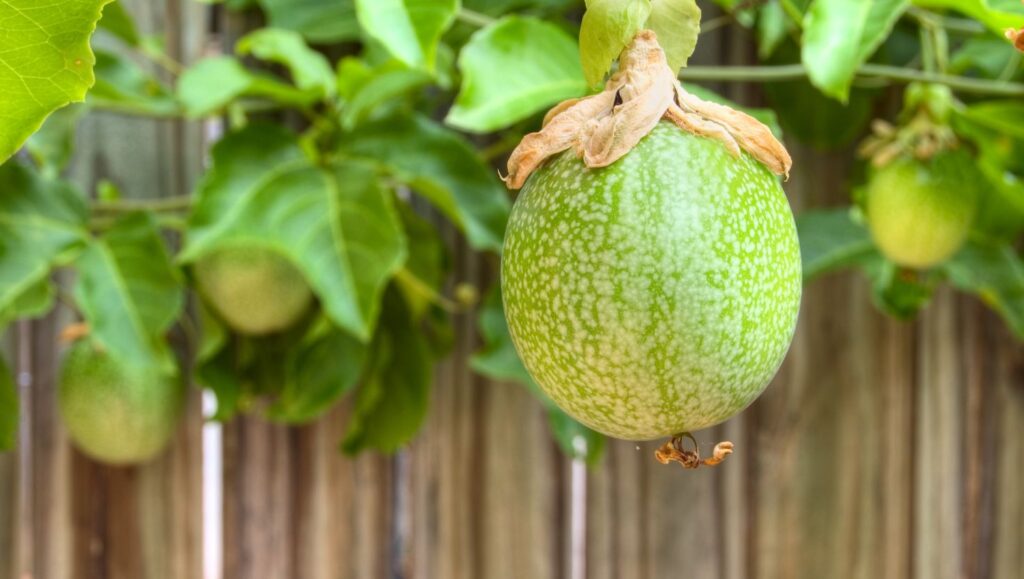
Essential Growing Conditions for Thriving Passionfruit Plants
- Sunlight: Requires full sun exposure, ensuring at least 6 hours of direct sunlight daily for optimal growth and fruiting
- Soil: Prefers well-drained, slightly acidic soil with a pH level between 6.5–7.5, enriched for best results
- Watering: Needs deep watering 2–3 times weekly, especially during dry spells, to maintain consistent soil moisture
- Fertilizing: A high-potassium fertiliser is advised every 4–6 weeks throughout the growing season to enhance productivity
- Pruning: Regular pruning after fruiting is crucial to promote fresh growth and prevent excessive overgrowth that can hinder fruit production
Top Passionfruit Varieties Ideal for Brisbane Gardens
- Nellie Kelly (Grafted Purple Passionfruit) – Celebrated for its robust disease resistance and remarkable productivity
- Panama Red & Panama Gold – Produces larger fruit, is heat-tolerant, and thrives exceptionally well in subtropical conditions
- Sweet Granadilla (Passiflora ligularis) – Offers aromatic fruit but prefers slightly cooler temperatures for optimal growth and flavour
Expert Tips for Successfully Cultivating Passionfruit on Your Pergola
- Train young vines along the pergola beams to encourage uniform growth and coverage across the structure, enhancing its visual appeal
- Regularly prune excess growth to improve airflow and sunlight penetration, both vital for healthy vine development
- Plant near a fence or trellis to offer additional support, ensuring the vines have sufficient structure to climb effectively
2. Kiwi Fruit (Actinidia deliciosa) – A Robust Climber Demanding Solid Support
Best for: Large, sturdy pergolas capable of supporting the weight of vigorous growth
Kiwi vines are renowned for their vigorous and heavy growth, thus necessitating a very sturdy pergola to adequately support their considerable weight. As deciduous plants, they shed their leaves during winter, allowing sunlight to filter through when shade is less vital, making them an excellent choice for year-round gardening and aesthetic appeal.
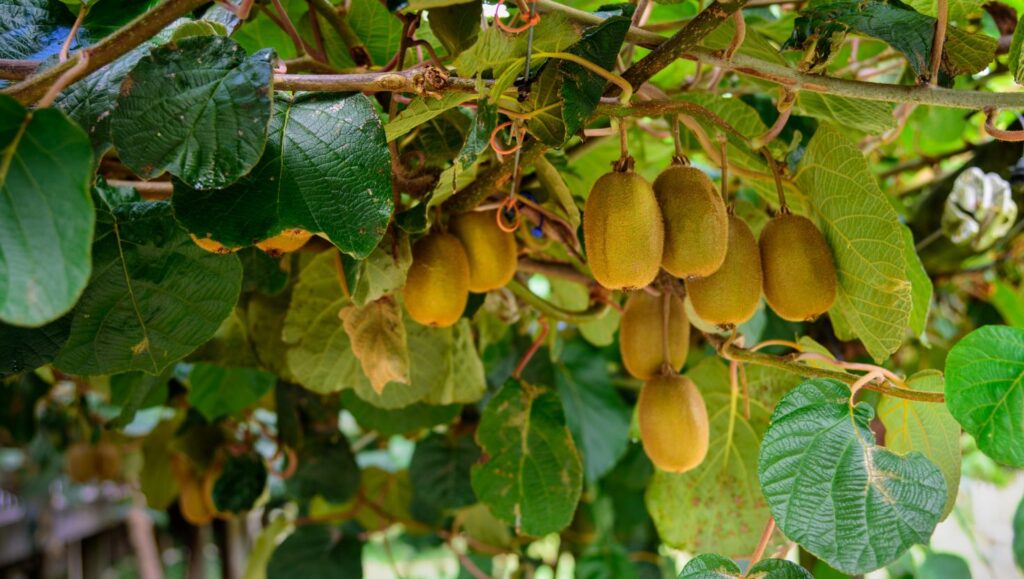
Key Growing Conditions for Optimal Kiwi Fruit Production
- Sunlight: Thrives under full sun exposure, ensuring it receives adequate light for robust growth and fruiting
- Soil: Requires well-drained, fertile soil enriched with compost to support vigorous growth and development
- Watering: Needs regular watering, particularly during dry spells, to prevent stress on the plant and promote healthy growth
- Fertilizing: Application of organic compost and slow-release fertiliser in spring will nourish the plant effectively
- Pruning: Regular pruning is essential for effectively managing growth and enhancing fruit yield
Understanding Kiwi Pollination Needs for Successful Fruiting
Kiwi vines are dioecious, meaning they possess distinct male and female plants. To achieve fruitful pollination and ensure successful fruiting, it is crucial to have at least one male plant for every 4–5 female plants, thereby promoting optimal pollination rates and subsequently enhancing fruit production.
Best Kiwi Varieties for Brisbane's Climate and Growing Conditions
- Hayward Kiwi – The most popular variety, requiring a male pollinator for fruit production to occur
- Bruno Kiwi – Renowned for its early fruiting and vigorous growth, making it a favourite among gardeners
- Issai Kiwi – A self-pollinating variety, ideal for smaller gardens with limited space
Effective Strategies for Growing Kiwi Fruits on a Pergola
- Install strong wooden or steel support beams to accommodate the vine’s weight, ensuring safety and stability for the plants
- Space vines at least 3–4 meters apart to allow for adequate spread and airflow between plants, which is crucial for healthy growth
- Regular pruning is necessary to manage excessive growth effectively, keeping the vines healthy and productive over time
3. Grapes (Vitis vinifera) – Infuse a Mediterranean Ambience into Your Pergola
Best for: Traditional garden pergolas that create shaded outdoor dining and relaxation experiences
Grapes present a fantastic option for pergolas, offering dense shade during the scorching summer months, while allowing sunlight to filter through in winter when they lose their leaves. They require seasonal pruning but are generally regarded as low-maintenance once established, making them an appealing choice for numerous gardeners seeking both functionality and aesthetic value.
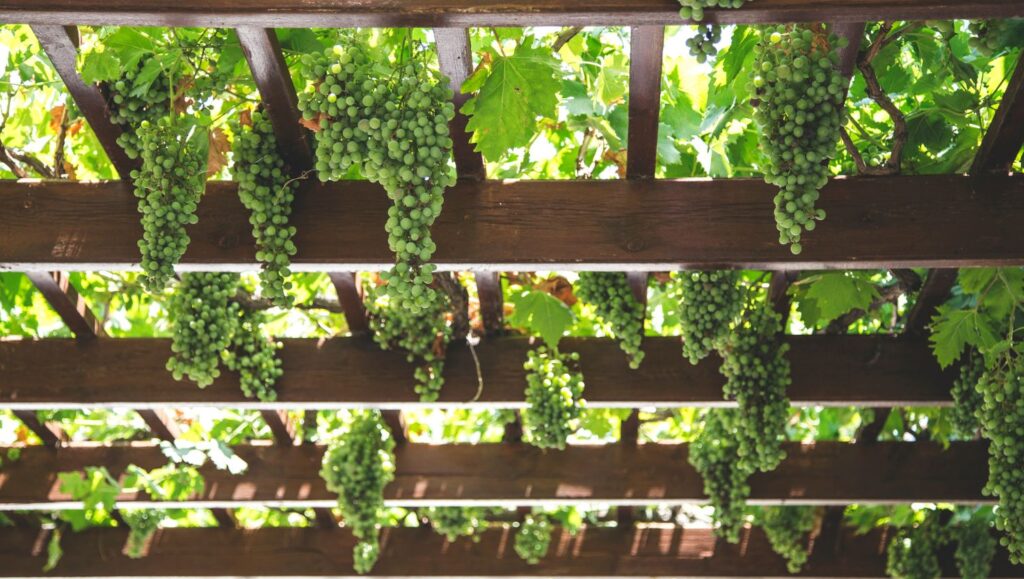
Optimal Growing Conditions for Thriving Grape Vines
- Sunlight: Requires full sun, ideally a minimum of 6 hours of sunlight daily for healthy growth and fruiting
- Soil: Prefers well-drained sandy or loamy soil that supports robust root health
- Watering: Needs deep watering weekly during dry periods to maintain moisture levels and support healthy growth
- Fertilizing: Application of organic mulch and balanced fertiliser in spring is beneficial for growth
- Pruning: Essential for removing excess wood and promoting fruit production, while ensuring the vines remain healthy
Best Grape Varieties for Gardens in Brisbane
- Flame Seedless – Known for its sweet red grapes, perfect for fresh consumption and snacking
- Sultana (Thompson Seedless) – Ideal for fresh eating or drying, providing versatility in use
- Black Muscat – Produces large, juicy fruit with a rich flavour, making it perfect for dessert wines
Expert Tips for Successfully Cultivating Grapes on Your Pergola
- Prune annually to maintain shape and promote fruiting spurs for maximum yield and productivity
- Train vines along pergola beams to achieve uniform coverage and support for healthy growth and aesthetic appeal
- Employ netting to protect fruit from birds during the ripening season to ensure a bountiful harvest
4. Choko (Sechium edule) – A Rapid-Growing, Low-Maintenance Climbing Vine
Best for: Gardeners seeking low-maintenance options and swift coverage for their outdoor pergolas
Choko (also referred to as chayote) is a fast-growing vine that produces abundant pear-shaped fruit. It is incredibly low-maintenance and can effectively cover a pergola within just a few months, making it an excellent choice for creating inviting shady areas. Be cautious not to confuse it with the “moth plant,” which is quite different in both appearance and characteristics.
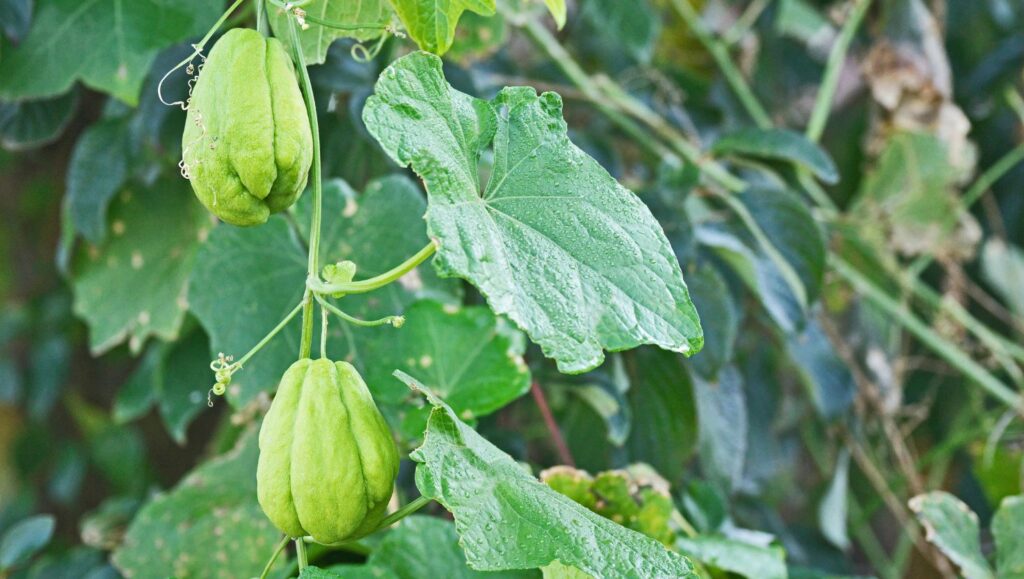
Optimal Growing Conditions for Choko to Flourish
- Sunlight: Thrives best in full sun to partial shade, adapting well to various lighting conditions
- Soil: Requires well-drained, compost-enriched soil that promotes healthy root development and growth
- Watering: Needs regular watering during dry months to keep the plants adequately hydrated
- Fertilizing: Benefits from organic compost and seaweed-based fertilisers to enhance growth and productivity
- Pruning: Regular trimming is necessary to control growth and maintain the desired aesthetic shape
Expert Tips for Successfully Growing Choko on Your Pergola
- Choko vines tend to spread quickly, so be prepared for frequent pruning to maintain control and shape in your garden
- Fruits grow on long tendrils, making them easy to spot and harvest when ripe, ensuring timely collection
- This vine can tolerate drier conditions, making it a suitable choice for Brisbane’s unique climate
Understanding the Critical Differences: Moth Plant vs. Choko
Numerous gardeners in Brisbane cultivate choko (Sechium edule) as an easy-to-manage vine for edible fruit and rapid pergola coverage. However, some may mistakenly grow the moth plant (Araujia sericifera), which is a toxic, fast-spreading vine native to South America and classified as an invasive weed in Queensland. Initially introduced as an ornamental plant, it has since evolved into a significant pest, smothering native vegetation and spreading aggressively throughout the landscape, posing a threat to local ecosystems.
If you’re cultivating choko or other climbing vines, it is vital to learn how to identify and eradicate moth plants before they proliferate and threaten your garden and surrounding environments.
5. Dragon Fruit (Hylocereus spp.) – An Exotic Climbing Cactus for Distinctive Edible Landscapes
Best for: Unique edible landscapes and gardens designed for minimal water usage
Dragon fruit is a cactus vine celebrated for its strikingly vibrant pink or yellow fruit filled with sweet, refreshing flesh. This plant demonstrates remarkable drought tolerance, making it an excellent candidate for low-maintenance gardens that flourish in Brisbane's climate.
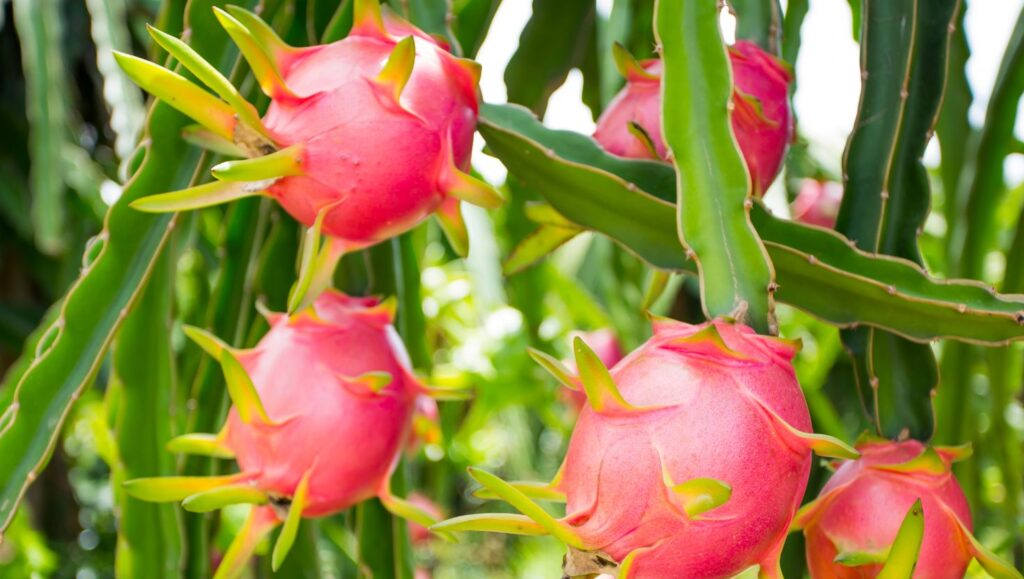
Optimal Growing Conditions for Successfully Cultivating Dragon Fruit
- Sunlight: Requires full sun to thrive, ensuring it receives ample light for healthy growth and fruiting
- Soil: Thrives in well-drained, sandy soil that is enriched with organic matter to support robust root health
- Watering: Minimal; requires deep watering only during dry months, making it very low-maintenance and easy to cultivate
- Fertilizing: Light applications of organic fertiliser are recommended every 2 months to promote healthy growth
- Pruning: Regularly check growth to keep it in check and encourage upward climbing, ensuring a structured growth habit
Best Dragon Fruit Varieties to Cultivate for Your Garden
- White-fleshed dragon fruit – Offers a mild, sweet flavour, perfect for fresh consumption and culinary uses
- Red-fleshed dragon fruit – Known for its intense sweetness and high antioxidant content, making it a popular favourite
- Yellow dragon fruit – Smaller in size but exceptionally sweet, adding diversity and visual appeal to your garden
Best Practices for Growing Dragon Fruit on Your Pergola
- Provide a sturdy trellis or pergola support, as dragon fruit can become quite heavy and requires stability for optimal growth
- Be aware that flowers bloom at night and are typically pollinated by bats or moths, so timing is crucial for successful fruiting
- Consider hand pollination to increase fruit yield, especially in regions with fewer natural pollinators, ensuring a productive harvest
Choosing the Perfect Fruiting Vine for Your Pergola
Each fruiting vine presents distinctive growth habits, weight requirements, and pruning needs. For instance, passionfruit is ideal for rapid coverage, while kiwi and grapes necessitate more robust pergolas to support their vigorous growth. Meanwhile, dragon fruit offers a unique edible option with minimal water needs, making it perfect for those aiming to create a low-maintenance garden with flavorful produce.
Are you prepared to design the ideal pergola to accommodate your fruiting vines?
Contact Pergolas Brisbane at (07) 3064 0661 for expert advice on custom pergola design and installation tailored to meet your garden's specific needs and enhance your outdoor living experience.
Best Fruiting Vines for a Pergola in Brisbane – Passionfruit, Kiwi & More
The Article: Fruiting Vines for Brisbane Pergolas: Passionfruit, Kiwi & More first appeared on https://writebuff.com
The Article Fruiting Vines for Brisbane Pergolas: Passionfruit, Kiwi & More Was Found On https://limitsofstrategy.com


Your exploration of fruiting vines on pergolas raises some intriguing considerations. While the idea of a shaded, fruit-bearing retreat is certainly appealing, I’m curious about the practicalities of managing these vines. For instance, while kiwi vines can be majestic, I’ve found that their maintenance can become quite labor-intensive due to their specific support needs and pruning requirements. Could you share recommendations for less demanding fruiting vines that still thrive in Brisbane’s subtropical climate? Additionally, it may be worth discussing how incorporating a diverse range of plants can benefit not just aesthetics but also local biodiversity. This could present an opportunity to create not just an outdoor haven but also a habitat for pollinators and beneficial insects. Engaging with nature in such a holistic way seems essential as we navigate urban development and its impact on green spaces. What do you think?
I appreciate your thoughts on the challenges of managing fruiting vines like kiwis! They can certainly add to the beauty of a pergola, but you’re right about the maintenance—they require quite a bit of attention. If you are looking for alternatives that are a bit more low-maintenance but still flourish in Brisbane’s subtropical climate, you might want to consider options like passionfruit or grapevines. Passionfruit tends to be quite forgiving and has that lovely, fragrant flower to boot. Plus, who doesn’t love a fresh passionfruit?
You bring up some valuable points about managing fruiting vines and the need for maintenance. Kiwi vines can be quite the commitment with their specific support and pruning needs, which isn’t ideal for everyone. For a more manageable approach in Brisbane’s subtropical climate, consider options like passionfruit or grape vines. They tend to be easier to care for and still deliver plenty of fruits while providing that lush canopy we all desire.
Thank you for your thoughtful insights! If you’re looking for recommendations on low-maintenance fruiting vines that thrive in Brisbane’s subtropical climate, I’ve compiled a list that might inspire your gardening journey. Explore diverse planting ideas that not only enhance your outdoor space but also support local biodiversity—check it out here!
https://fpliverpool.co.uk/krystal